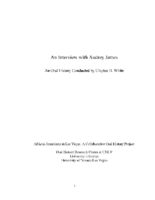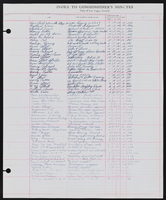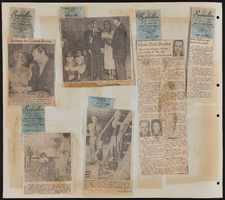Search the Special Collections and Archives Portal
Search Results
Joyce Bush oral history interview
Identifier
Abstract
Oral history interview with Joyce Bush conducted by Claytee D. White on September 20, 1995 for the UNLV University Libraries Oral History Collection. In this interview, Bush discusses the formation of her non-profit organization, International Youth for Christ Choir. She explains that she developed the idea in 1994, based on the "True Love Waits" abstinence program of the Baptist Church. She explains how the organization was formed, the process of building a board of directors, ideas about fundraising, publicity, and soliciting donations, attracting youth to the organization, her hopes for the future of the organization, and the reasons corporate sponsorship was unlikely because they tend not to support religious groups.
Archival Collection

Transcript of interview with Audrey James by Claytee D. White, July 20, 2012
Date
Archival Collection
Description
Interview with Audrey James conducted by Claytee D. White on July 20, 2012. James moved to Las Vegas in 1952 and worked as an elementary school teacher. She also spearheaded a project to provide books for children in African countries, volunteered in a food bank operation, and has been an active church member.
Text
Celia Rivero Grenfell oral history interview
Identifier
Abstract
Oral history interview with Celia Rivero Grenfell conducted by Patricia Holland on March 31, 1977 for the Ralph Roske Oral History Project on Early Las Vegas. Grenfell first talks about her family background in Mexico and later describes her family’s restaurant business. She also describes her education, recreational activities, Downtown Las Vegas, Nevada; and Helldorado. Grenfell discusses racial segregation and prejudice, El Rancho Vegas, Lorenzi Park, early churches, environmental changes, early air conditioning, and Grenfell’s early work in a laundry business.
Archival Collection

Transcript of interview with Samuel and Sherrill Coleman by Claytee White, February 12, 2016 and February 22, 2016
Date
Archival Collection
Description
Sherrill and Samuel Coleman moved to Las Vegas during the 1990s after both enjoying a full life and numerous careers in other parts of the United States. They met each other through church in 1998 and married each other in April 1999. Now retired, both Samuel and Sherrill remain active in their church community. Samuel Coleman was born in Durant, Mississippi in 1928 to a sharecropping family. His father died when he was 13 months old, leaving his mother to raise seven children by herself. Over time, his family slowly migrated to Chicago and he joined them when he was 15. For eight months, Samuel worked a number of different jobs until he began to work for Burlington Railroad as a four cook. The United States Army drafted him in 1951 and sent him overseas to work in a motor pool for a military hospital in Korea, despite his status as a conscientious objector. At war’s end, he returned to work for Burlington. During his last 17 years with the railroad, Samuel successfully petitioned to join the Brotherhood of Sleeping Car Porters, the union for railroad cooks, porters, and waiters, to improve the working and sleeping conditions at Burlington Railroad. He retired from the railroads in the 1970s and chose to pursue other careers. Until his official retirement in 1993, Samuel worked in real estate, as the owner of a liquor store, a firefighter, a restaurant inspector, and a deacon for his church. His daughter from his first wife moved to Vegas to pursue a career as a teacher and after a number of visits, Samuel decided to follow her in 1999. Sherrill Coleman was born in Newton, Kansas in 1941. Like many other African American women in her community, she worked as a housekeeper for a number of years. She and her first husband moved to Los Angeles County in 1964 where she took a temporary job in the elections department of the local government. In 1967, Sherrill became a file clerk for Los Angeles County’s Department of Public Social Services. By the time she left the department, she was middle management in the auditing department. She moved to Vegas in 1993.
Text
Everlena Brown oral history interview
Identifier
Abstract
Oral history interview with Everlena Brown conducted by Claytee D. White on June 15, 2016 for the African Americans in Las Vegas: a Collaborative Oral History Project. In this interview, Brown discusses her upbringing in Moro, Arkansas and moving to Little Rock, Arkansas. She talks about the Little Rock Nine students and her experience attending a segregated school for African Americans. Brown recalls attending Clark County Community College (now College of Southern Nevada) and the University of Nevada, Las Vegas (UNLV), becoming a nurse, and the process of applying for nursing positions. Later, Brown discusses living in the Westside, entertainment on Jackson Street, and participating in church activities. Lastly, Brown describes changes in the Westside.
Archival Collection
Leon Green oral history interview
Identifier
Abstract
Oral history interview with Leon Green conducted by Claytee D. White on May 15, 2012 for the African Americans in Las Vegas: a Collaborative Oral History Project. In this interview, Green discusses his personal history and growing up in West Las Vegas, Nevada. He talks about the African American community on the Westside, his educational experiences, and being involved in various church activities. Green describes the significance of spirituality in the African American community and how the Westside was deeply spiritual. He then talks about Westside community leaders Bishop C. C. Cox and Reverend Bennett, rioting on the Westside, and the community response to the changing racial climate. Lastly, Green discusses the growth and increase of businesses on the Westside.
Archival Collection




